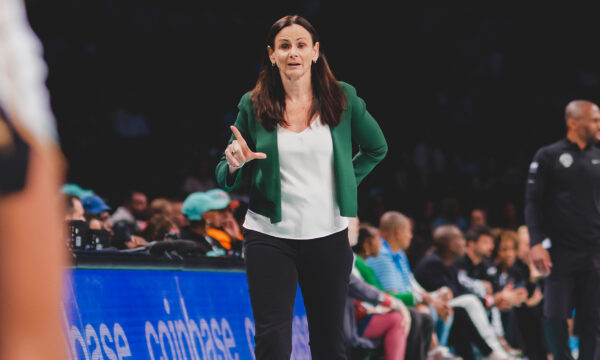
Shop This Look
What Do You Wish Someone Had Told You Before You Went Back to School?
Seven women share their grad-school regrets, wins, and words of advice.
“Back to school” season is in the air, and we’re here to help you relive that infectious first-day feeling with magical outfit inspiration, confidence-boosting suiting appointments—and stories of real women’s academic pursuits.
Toying with the idea of going to grad school? Before you send in those applications sitting on your desk, you’ll want to study up on others’ experiences. To get you started, we asked seven women to share what they wish someone had told them before they went back to school. Their honest answers below.

Want more M Dash?
Sign up for our weekly newsletter.
Thank you!
Nothing Can Replace Real-World Work Experience
“Going back to school was always part of my high-level game plan. Just before I finished my undergrad, I received some advice from an HR manager at my internship: Don’t jump the gun and dive right into grad school—even if finding a job proves to take longer than I’d like. She said that, all too often, she sees resumes from people who were eager to get an MBA but end up becoming overqualified for entry-level roles. At the same time, they’re under-qualified in other ways, since they never had work experience that could help them get the most value out of grad school. I took this advice seriously and continued on my job hunt. Luckily, I found a job that gave me the opportunity to grow and learn.
Once I did finally make the decision to go back to school, I dramatically underestimated how emotionally trying it would be to choose between a full-time or part-time schedule. After crying several times during conversations with my parents, I decided to remain working full-time while taking classes part-time. I made this decision because I didn’t want to lose the salary I was currently making, which I could use to begin paying off the cost of school. Looking back, this was the best decision I could have made for my financial well-being, academic enrichment, and career growth. I’m able to bring professional scenarios, wins, and challenges to school to use as learning opportunities. On the flip side, I can incorporate structured best practices and theoretical knowledge into my work. While juggling both school and work has been difficult and stressful at times, I think I’m a stronger student and employee, since each experience adds value to the other.”
“I wish I’d taken that time to contemplate what success looks like to me: Where do I want to see myself in 10-20 years? What will I do if my plan doesn’t work out the way I think it will?”
It Doesn’t Give You All the Answers
“I decided to go back to school mainly for the confidence and credibility I thought I would gain from it. I graduated college with an art history degree, and even after a few years in a finance role, I felt the need to prove I was analytical and a ‘math-forward’ employee. I thought in business school, I would learn how to solve these tactical problems and that, by the end, I would know how to do whatever my future career required.
It turned out that getting an MBA did not help me determine what my ultimate career goal would be. The process of applying to business school forces you to think about this question, but even in my first year, what I had written in my application was no longer on the table. Instead, I followed what about a third of my class did and pursued a role in an industry that was known to be difficult—but prestigious. I thought my career was set and that every future step would become clear to me as soon as it was time to sign onto a job. I didn’t spend too much time thinking about the future beyond the first few years out of school, and that was a mistake.
I’m now one year out of business school, and I’ve already left that first job I took. I have a new role lined up, but I have no idea what it will lead to or where exactly it fits into my narrative. I wish I’d taken that time to contemplate what success looks like to me: Where do I want to see myself in 10-20 years? What will I do if my plan doesn’t work out the way I think it will?
For anyone considering business school, I would definitely tell them to go for it; it was an invaluable experience that pushed me beyond what I thought was possible. I just wish someone had told me to explore different industries and functions that I didn’t think I was capable of.”
“While I was originally concerned that boundary-setting would lead to my superiors and peers thinking of me as lazy or unwilling to be a team player, the exact opposite occurred. I was able to focus on and invest in the areas where I had true passion.”
Don’t Be Afraid to Say “No”
“I wish I knew the power of ‘no’ before I entered graduate school. Excited by all the opportunities in this new phase of life, I quickly stretched myself too thin. After trying and failing to juggle each and every academic and social activity that came my way, burnout quickly set in. It took some time to realize that quality was better than quantity when it came to most aspects of my life. These competing activities included extracurriculars, social engagements, and a number of bonus tasks requested by supervisors and professors. With a great deal of discomfort, I began saying ‘no’ in a polite, but firm, manner. I started optimizing my time by cutting out things that didn’t bring me joy or purpose. I created boundaries around my working hours and made sure to build in time for self-care.
While I was originally concerned that boundary-setting would lead to my superiors and peers thinking of me as lazy or unwilling to be a team player, the exact opposite occurred. I was able to focus on and invest in the areas where I had true passion. This focus allowed me to excel academically and gave me the space to build rich relationships both professionally and personally. While saying no never became comfortable, it did become easier over time. Looking back on my time in graduate school, learning how to turn things down was one of the most valuable skills I learned.”
“Although I had my degree, it was difficult to feel accomplished when I didn’t immediately find my ‘forever job’ and my friends were no longer newbies in their fields.”
You’ll Probably Feel Like You’re Falling Behind
“Looking back at my full-time master’s program, I mostly remember the stress of feeling like I was falling behind in life. While my friends were building careers, getting promoted, and padding their resumes, I was still in school and waiting to start my career. This feeling persisted even after graduation, because my first job out of school was short-lived—as was my second. Although I had my degree, it was difficult to feel accomplished when I didn’t immediately find my ‘forever job’ and my friends were no longer newbies in their fields.
I wish someone had warned me about that feeling of lagging behind my peers. Although I eventually found a job I love, going back to school often felt like a pause on life, and I found myself frequently thinking that I could’ve been using the time more effectively by getting a job and saving money. Ultimately, I am so happy I pursued higher education, since it led me to a more fulfilling career path, but it took a while to feel like I’d ‘caught up’ to others. I encourage people to remember that it’s admirable to take time to concentrate on your education. If you’ve chosen to go back, it’s likely because you’re following your passion, and that is worth it.”
“While going back to school was undoubtedly beneficial in the long run, I underestimated the impact it would have on my immediate professional advancement.”
Pivoting Takes Patience
“One aspect of graduate school that caught me off guard was the potential delay in short-term career progress. While going back to school was undoubtedly beneficial in the long run, I underestimated the impact it would have on my immediate professional advancement. By leaving a career as an electrical engineer to become a lawyer, I essentially started from scratch in terms of building a network and gaining relevant experience.
The learning curve of such a drastic career change was steep, and it required a tremendous amount of dedication and perseverance. If you’re looking to make a similarly extreme change, be prepared for the challenges that come with starting anew—from acquiring new knowledge and skills to adapting to a different work culture—and do your research. It takes work to understand the potential personal, professional, and financial challenges that may lie ahead, especially when it comes to entering a completely new field.”
“I wish that somebody had told me that the free time I had in between classes would not be enough to finish all my school work and thesis study, plus have a fulfilling personal life.”
Set Realistic Expectations
“When I decided to pursue a master’s degree in genetics, I left my full time job so I could focus on my studies. Even then, I wish that somebody had told me that the free time I had in between classes would not be enough to finish all my school work and thesis study, plus have a fulfilling personal life. I only had a few classes, so I was hoping to spend more time with my family and travel with them, but nobody warned me about the all-consuming demands of graduate school. Between research and papers, I rarely had the chance to relax with my loved ones. Don’t get me wrong: I would do it all again in order to be able to work in the field I love, but I would have been in a better headspace if I’d come more mentally prepared.”
Stay Connected
“I majorly pivoted careers when I left photography to become a psychotherapist. When I entered grad school, I viewed my classmates as peers, project partners, and friends, but I didn’t realize how vital these connections would be after graduate school.
When it came to scoring interviews, identifying career opportunities, and building a support system of colleagues, I underestimated the power of having a network. Luckily, I learned very early on that I need to stay connected, since I got one of my first therapy jobs from a classmate who recommended me to her boss. I still confer with some of my former classmates as we advance in our careers, and we regularly approach industry-specific hurdles in tandem. The loyalty we have for each other is deep-rooted, and I now appreciate the potential for long-lasting support that grad school has to offer.”










